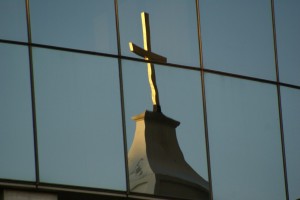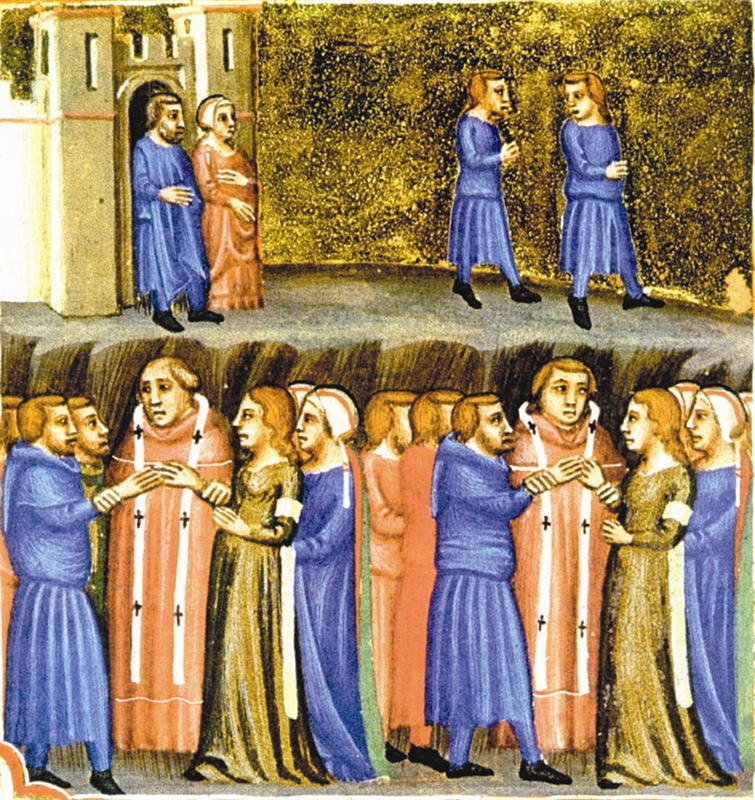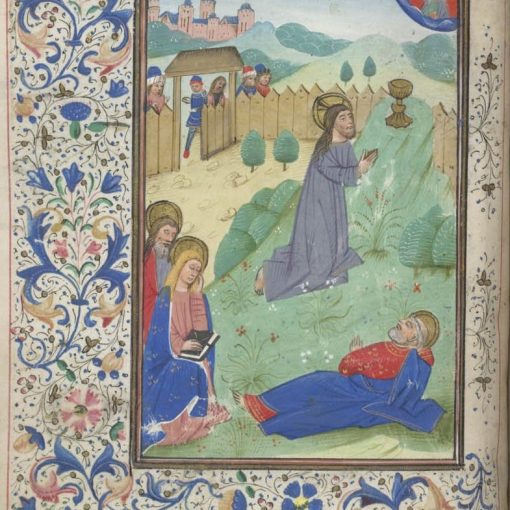The following is my sermon from this past Sunday. As you can see in the first paragraph, I am somewhat apologetic about the fact that I cannot read and reflect on our current readings without thinking of Mack and our loss. Then again, I realized that this is precisely what Easter is about for all of us, death and resurrection, loss and hope. — Cb
Fifth Sunday of Easter – Year C RCL
Revelation 21:1-6
John 13:31-35
Collect: Almighty God, whom truly to know is everlasting life: Grant us so perfectly to know your Son Jesus Christ to be the way, the truth, and the life, that we may steadfastly follow his steps in the way that leads to eternal life; through Jesus Christ your Son our Lord, who lives and reigns with you, in the unity of the Holy Spirit, one God, for ever and ever. Amen.
“Do not abandon yourselves to despair. We are the Easter people and hallelujah is our song.”
Pope John Paul II
We as a western community, although we are part of a liturgical community in the Episcopal Church, forget that Christmas and Easter are seasons and not simply a single day. We continue to be in the Easter season and this is the 5th Sunday of Easter. I feel I should open this sermon with an apology because I know that my own circumstances with the death of our son will come into my thoughts and comments. Yet, as tragic as our circumstances are I know we are not alone. We all have lost loved ones, often very close; we all struggle and suffer. But this is what Easter is about, death and resurrection, loss and hope. That is what our readings are about, living in this world, after the ascension and before the New Jerusalem shall descend from Heaven.
JP2 said, “Do not abandon yourselves to despair. We are the Easter people and hallelujah is our song.” Despair is all too easy in this world. I do not need to belabor the point. We see and feel it. The last six months alone in our safe and secure country have given us ample examples and the majority of the lives with far greater dangers of war, disease, malnutrition, and persecution.
Jesus knew that his disciples would face the worst days of their lives immediately following this last meal as a community. Judas had gone out to betray him and soon he would be beaten and crucified. His “glorification” would be his sacrifice. And what does he say to them? Love one another.
33 Little children, I am with you only a little longer. You will look for me; and as I said to the Jews so now I say to you, ‘Where I am going, you cannot come.’ 34 I give you a new commandment, that you love one another. Just as I have loved you, you also should love one another. 35 By this everyone will know that you are my disciples, if you have love for one another.”
You have often heard me say (assuming you have heard my sermons) that love is not this emotional arousal that we often equate with the term, nor is it a simple “no matter what you do I will still stand by your side.” Love is not “liking” and it is very hard because sometimes it means taking a difficult stand, even against the one you love.
In the days, weeks, and months that followed the disciples would be challenged as never before in their relationships. What had begun as following a great teacher, tough enough for some family members to accept I am sure, now became an outrageous claim to believe that Jesus was the Messiah, the Son of God raised from the dead! They would be spurned, rejected, and persecuted and that just by those closest to them. “Love one another” was probably the greatest challenge Jesus could give them and us.
Our reading from Revelation may seem odd, as the entire book does to many, but it too is part of living as an “Easter people.” The book was written sometime in the mid to late first century when Christianity had gathered enough support and followers that they garnered the attention of more than a few people. Nero famously blamed the Christians on the burning of Rome in 64 and in the last two decades local persecutions of Christians began to spread around the empire.
Into this chaos John of Patmos received his “revelation.” (Note the lack of plural!) The fantastic images of fire and judgment, angels and saints, beasts and demons, and the New Heaven and New Earth are all intended to encourage the community of the faithful. Just as Daniel with the witness of God saving him from the Lion’s den when he refused to bow down to Nebuchadnezzar, so too the church should be reassured that all is in God’s hands, even as it seems to be falling apart all around us.
This is the fundamental tension that we have to grasp: we live in a fallen and broken world, yet it is a world that is being and will be redeemed in Christ. This world full of free will and its effects hurts us all. It is full of wicked people, cancers, and infections. Innocent people die and the wicked flourish. BUT this is not the end of the story nor even the end of this world.
Just as we are being transformed by Christ now as we live in this world, learning to love another, especially the unlovable, and as we will fully come into our completed lives when we are raised with Christ, so this world will finally be seen and enjoyed in all of the glory that God intended.
For we and all those saints that have gone before including Mack and Martin will complete the transformation begun in this world in the next. That is the promise of Easter. As Paul said,
1 Cor. 15.20 But in fact Christ has been raised from the dead, the first fruits of those who have died. 21 For since death came through a human being, the resurrection of the dead has also come through a human being; 22 for as all die in Adam, so all will be made alive in Christ.
And in John’s vision we are given a further taste of the greater glory. The ultimate reality is that in God there is the justice that is not present in this world and there is the reward that we inherit solely through the sacrifice of Christ on our behalf. God’s order will be fully established and even nature itself will be restored to the glory for which she was created.
In Genesis we are told that God made the heavens and earth and it was “very good.” He walked in the garden with humanity. That is heaven, living with God, hanging out with him and enjoying company with God and one another. What does it look like exactly? I don’t know. John saw a golden city where each gate is a single pearl. If that vision were given today, what would it look like to you or to me? I don’t know, perhaps a lot of perfectly flat and open fields and a lot of soccer.
What I know and the truth that we are given is that for now we have one another and that we are to love one another as best we can. And that when we do enter together into that new heaven and earth we will be with God and all will be well.
3 “See, the home of God is among mortals.
He will dwell with them as their God;
they will be his peoples,
and God himself will be with them;
4 he will wipe every tear from their eyes.
Death will be no more;
mourning and crying and pain will be no more,
for the first things have passed away.”







One thought on “A vision of Heaven”